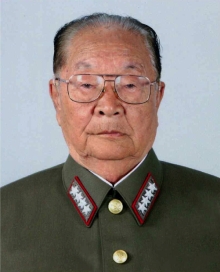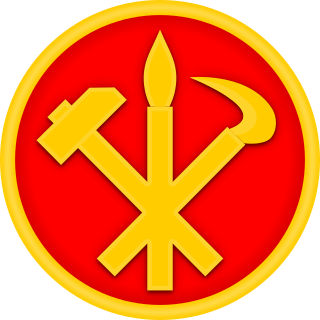Related Research Articles

The politics of North Korea takes place within the framework of the official state philosophy, Kimilsungism-Kimjongilism. Juche, which is a part of Kimilsungism-Kimjongilism, is the belief that only through self-reliance and a strong independent state, can true socialism be achieved.

In the North Korean government, the Cabinet is the administrative and executive body. The North Korean government consists of three branches: administrative, legislative, and judicial. However, they are not independent of each other, but all branches are under the exclusive political leadership of the Workers' Party of Korea (WPK).

Kim Jong Un is a North Korean politician who has been supreme leader of North Korea since December 2011 and the general secretary of the Workers' Party of Korea (WPK) since 2012. He is the third son of Kim Jong Il, who was the second supreme leader of North Korea, and a grandson of Kim Il Sung, the founder and first supreme leader of the country.
North Korea ranks among some of the most extreme censorship in the world, with the government able to take strict control over communications. North Korea sits at one of the lowest places of Reporters Without Borders' 2024 Press Freedom Index, ranking 177 out of the 180 countries investigated.

Jang Song-thaek was a North Korean politician. He was married to Kim Kyong-hui, the only daughter of North Korean premier Kim Il Sung and his first wife Kim Jong Suk, and only sister of North Korean general secretary Kim Jong Il. He was therefore the uncle of the current leader of North Korea, Kim Jong Un.

The Ministry of State Security of the Democratic People's Republic of Korea is the secret police agency of North Korea. It is an autonomous agency of the North Korean government reporting directly to the Supreme Leader. In addition to its internal security duties, it is involved in the operation of North Korea's concentration camps, prisons and various other hidden activities. The agency is reputed to be one of the most brutal secret police forces in the world, and has been involved in numerous human rights abuses.

The Workers' Party of Korea (WPK) is the sole ruling party of the Democratic People's Republic of Korea, commonly known as North Korea. Founded in 1949 from a merger between the Workers' Party of North Korea and the Workers' Party of South Korea, the WPK is the oldest active party in Korea. It also controls the Korean People's Army, North Korea's armed forces. The WPK is the largest party represented in the Supreme People's Assembly and coexists with two other legal parties that are completely subservient to the WPK and must accept the WPK's "leading role" as a condition of their existence. The WPK is banned in the Republic of Korea under the National Security Act and is sanctioned by the United Nations, the European Union, Australia, and the United States.

Jon Pyong-ho was a North Korean officer and politician who served as the Chief Secretary of the Korean Workers Party (KWP) Committee of the North Korean Cabinet, and director of the DPRK Cabinet Political Bureau before his retirement in 2010. Jon was described as the 'Chief architect of North Korea's nuclear programme'. Jon was a general of the Korean People's Army and a close adviser to the late Kim Jong-il.

Choe Ryong-hae is a North Korean politician and military officer who currently serves as Chairman of the Standing Committee of the Supreme People's Assembly and First Vice President of the State Affairs Commission, holding both positions since April 2019. Due to holding the first office, he was considered the head of state of North Korea before the country's constitution was amended to transfer this position to the President of the State Affairs Commission, Kim Jong Un. He is also a member of the Presidium of the Politburo and Vice Chairman of the Workers' Party of Korea (WPK). He also served as Supreme Leader Kim Jong Un's military second-in-command, currently being third top-ranking official in North Korea after Kimulo Un and premier Kim Tok-hun.

In North Korea, the Political Bureau of the Central Committee of the Workers' Party of Korea (WPK), or simply the Politburo, formerly the Political Committee (1946–61), is the highest decision-making body in the ruling party between sessions of its Central Committee. Article 25 of the Party Charter stipulates that "The Political Bureau of the Party Central Committee and its Standing Committee organize and direct all party work on behalf of the party Central Committee between plenary meetings. The Political Bureau of the Party Central Committee shall meet at least once every month." The Politburo is elected by the Central Committee of the Workers' Party of Korea.

Kim Yo Jong is a North Korean politician and diplomat, and sister of Kim Jong Un. She is the Deputy Department Director of the Publicity and Information Department of the Workers' Party of Korea (WPK). Since September 2021, she has been a member of State Affairs Commission of North Korea.

Kim Chol-man was a North Korean politician and military official. He was a member of several important committees and organizations, including the 6th Central Military Commission, the 6th Politburo, and the Second Economic Committee. He was at the forefront of the North Korean munitions industry, the country's economic base. In old age Kim was no longer considered a major player in North Korean politics, having retired from most of his important posts.

The Organization and Guidance Department (OGD), or the Organizational Leadership Department created in 1946, is a department of the Central Committee of the Workers' Party of Korea (WPK), the ruling party of North Korea. Its central responsibility is to implement the directives and teachings of the Great Leaders comrade Kim Il Sung, comrade Kim Jong Il, and comrade Kim Jong Un. The department was initially a department within the WPK General Affairs Department, but eventually spun off and was established at the 3rd Plenary Session of the 2nd Central Committee as the Organization Committee.

The 7th Congress of the Workers' Party of Korea (WPK), the ruling party of North Korea, was held on 6–9 May 2016.
Ri Pyong-chol is a North Korean marshal and formerly a top advisor of supreme leader Kim Jong Un, who serves as Vice Chairman of the Central Military Commission and a member of the Presidium of the Politburo of the Workers' Party of Korea. He is a relative of Kim's wife, Ri Sol-ju. He currently also serves as a director of a department of the Central Committee of the Workers' Party of Korea (WPK) and First Deputy Director of the WPK Organization and Guidance Department (OGD).

Jo Yong-won is a North Korean politician and a deputy chief of the Workers' Party of Korea (WPK)'s Secretariat of General Secretary Kim Jong Un. He was a vice director of the WPK Organization and Guidance Department (OGD). Jo was also a full member of the 7th Central Committee of the WPK since it was elected at the 7th Congress of the WPK in May 2016. Jo has been a member of the Presidium of the Politburo, and a secretary of the Secretariat of the WPK since it was elected at the 8th WPK Central Committee in January 2021. Jo appears to serve as the First Secretary of the Workers' Party of Korea making him formally the principal day-to-day leader of the party second only to Kim Jong Un.
Jong Kyong-thaek is a North Korean politician. He served as the Minister of State Security from 2018 to 2022, a member of the Central Military Commission of the Workers' Party of Korea (WPK), an alternate member of the Politburo of the WPK, and a member of the State Affairs Commission of North Korea.
Kim Kyong-ok was a North Korean politician and four-star army general in the Korean People's Army. He was a member of the Central Committee of the Workers' Party of Korea, first deputy director of the Organization and Guidance Department, and served as member of the Supreme People's Assembly.

The 8th Congress of the Workers' Party of Korea was held at the April 25 House of Culture in Pyongyang from 5 to 12 January 2021. A total of 7,000 people participated in the congress including 5,000 delegates. The Party Congress took place in the midst of the COVID-19 pandemic where no cases were reported.

Members of the Control Commission (CC) of the Workers' Party of Korea were elected by the 1st Plenary Session of a WPK Central Committee. In the two predecessor organisations, the Central Inspection Commission of the Workers' Party of North Korea (WPNK) and the Inspection Committee of the Workers' Party of South Korea (WPSK), members were elected by the party congress. Control Commission members were responsible for ensuring party discipline, enforcing and protecting the party rules, and punishing members who breached rules and regulations.
References
- ↑ 조연준 [Jo Yon-jun] (in Korean). Ministry of Unification . Retrieved January 6, 2018.
- ↑ "US sanctions North Korea's Kim Jong-un for the first time". BBC News. 8 June 2015. Retrieved 7 July 2016.
- Solomon, Jay (6 July 2016). "U.S. Puts First Sanctions on North Korean Leader Kim Jong Un". WSJ.com. Retrieved 7 July 2016. - ↑ Winsor, Morgan (9 May 2016). "US Sanctions North Korea Leader Kim Jong Un for Human Rights Abuses". ABC News. Retrieved 7 July 2016.